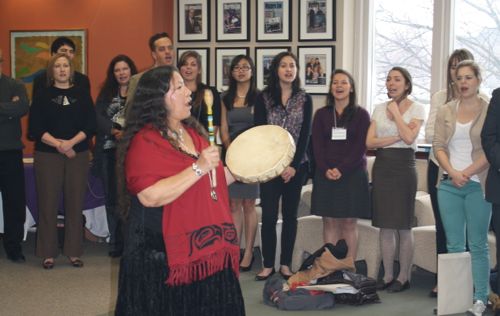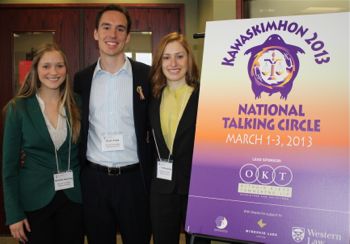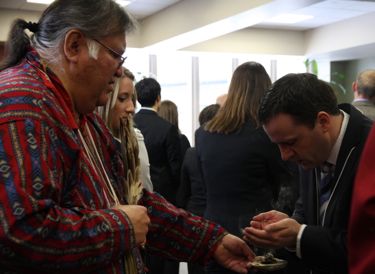Aboriginal moot inspires students
March 06, 2013
 More than 100 people from across Canada gathered at Western
Law this past weekend to take part in a unique mooting experience.
More than 100 people from across Canada gathered at Western
Law this past weekend to take part in a unique mooting experience.
The National Kawaskimhon Aboriginal Moot, held on March 1-3, incorporated the Talking Circle process as a model for building consensus over difficult legal issues.
The Kawaskimhon Moot was established to provide law students with a forum to reconcile indigenous and non-indigenous legal orders and values as they relate to a pressing contemporary issue for Aboriginal peoples.
Sixty-five law students from 17 law schools immersed themselves in a simulated multi-party negotiation on the question of whether alienable real property rights should be introduced on reserves.
“The students performed admirably and with great sensitivity,” said Prof. Michael Coyle, the moot’s director. “During a weekend of negotiations, they had the challenging role of advocating, in the context of aboriginal values and legal orders, that First Nations consider such a law reform.”
The first Kawaskimhon Moot was held in 1994 at the University of Toronto and since has been hosted by various law schools across Canada. This was Western Law’s first time hosting this unique moot.
 "My participation in this year's Kawaskimhon Talking Circle
was a humbling and profoundly moving experience,” says Maeve Mungovan (pictured far right along with Devin Fulop and Michelle Manning) who represented Western Law at the moot.
"My participation in this year's Kawaskimhon Talking Circle
was a humbling and profoundly moving experience,” says Maeve Mungovan (pictured far right along with Devin Fulop and Michelle Manning) who represented Western Law at the moot.
“I learned a new advocacy dialect: one that fosters dialogue, reaching common understandings and reconciling different interests. The Kawaskimhon also deepened my appreciation for the uniqueness and diversity of Indigenous cultures, many of which were represented by the participants," Mungovan said.
"Their personal connections to the problem at hand, and to Aboriginal issues more generally, personalized these issues and gave me a far better understanding of Aboriginal perspectives in multi-party negotiations with the Crown and other First Nations."
Ron George LLB’90, coach of the Windsor Law team, said the moot often affects students in a very deep way.
“It gives them an opportunity to experience native culture and values. Students come face to face with a cultural tradition that is very spiritual and that experience can often have a profound effect.”
 Respected Elders Dan Smoke and Mary Lou Smoke opened the
moot with a traditional smudge ceremony and song.
Respected Elders Dan Smoke and Mary Lou Smoke opened the
moot with a traditional smudge ceremony and song.
Professor Michael Coyle and Dean Iain Scott welcomed the team and their coaches and thanked Justice Jonathon C. George, Stephen J. Augustine and Lawyer Kathleen Lickers who served as facilitators.
At the opening banquet, keynote speaker Augustine delivered an inspirational talk on Indigenous approaches to conflict.
Western Law would like to thank the firm of Olthuis, Kleer, Townshend LLP (OKT) for their lead sponsorship of this year's Kawaskimhon Moot and McKenzie Lake for their generous support.






